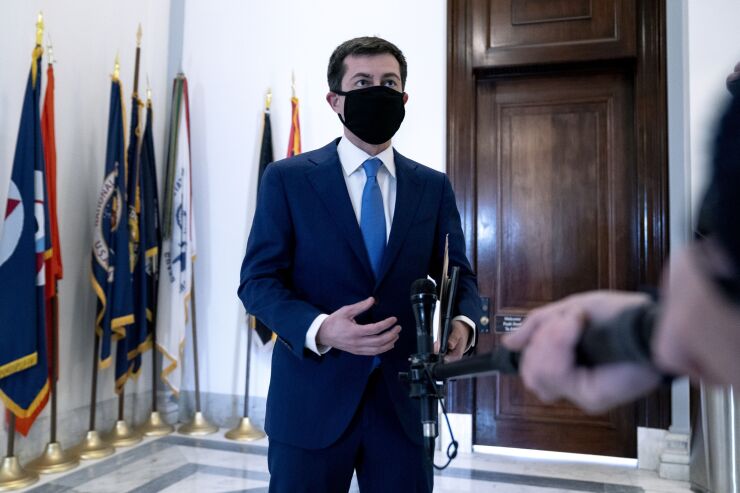Days ahead of the Biden administration’s planned infrastructure agenda roll-out, Transportation Secretary Pete Buttigieg highlighted private activity bonds as a way to bring more private investment into infrastructure financing.
During a House Transportation and Infrastructure hearing Thursday, Buttigieg said “it would be a mistake to neglect the possibility of mobilizing private capital,” mentioning PABs without prompting by a lawmaker.
“I want to mention and highlight the private activity bond, or PAB allocation authority, that we do have,” Buttigieg said when asked if infrastructure banks were being considered as part of the Biden proposal.

“I would mention that (PABs) as something that is already there,” Buttigieg said. “That might be adjusted in terms of its capacity, but I also really welcome the concept of an infrastructure bank or some other vehicle that can help us to mobilize what we know is a lot of private capital sitting on the sidelines when we such demonstrated need across the country.”
PABs allow government entities to borrow on behalf of private parties for certain projects while maintaining the bonds’ tax-exempt status. They often support projects like high-occupancy toll lanes and bridges.
PAB issuance is subject to a $15 billion dollar federal cap, which has been pretty much reached at $14.9 billion, according to the Build America Bureau of the DOT. That cap was established under the Safe, Accountable, Flexible, Efficient Transportation Equity Act: A Legacy for Users or SAFETEA-LU in 2005 and is separate from the individual state volume caps set by an Internal Revenue Service Formula.
Ultimately raising the PAB cap will be up to Congress, where it has bipartisan support.
The Biden administration is expected to roll out the president's $3 trillion infrastructure proposal in Pittsburgh on March 31, according to multiple news reports. The legislation is expected to be two parts — one that deals with traditional transportation projects like roads and bridges and another that addresses domestic priorities such as universal pre-kindergarten and free community college tuition.
Republicans have been against raising taxes to pay for infrastructure, while Democrats have pushed for a wider scope infrastructure bill that goes beyond roads and bridges. That has led some to believe that budget reconciliation may be a likely way to pass an infrastructure bill.
Reconciliation, a tool created to allow lawmakers to conform tax and spending levels to the levels set in a budget resolution, can only be used twice this year and was used already to pass COVID relief this month.
Sources have said reconciliation bill or not, municipal bond provisions will be included.
At a Senate Commerce Committee hearing Wednesday, Sen. Roger Wicker, R-Miss., touted his bill to reinstate tax-exempt advance refunding, which was reintroduced this year. He made those comments after Atlanta Regional Commission Executive Director Douglas Hooker told the panel communities needed “skin in the game” when it comes to infrastructure.
“Let’s talk about ways for you to have more skin to put into the game,” Wicker said. I introduced the LOCAL infrastructure act last year which would provide additional funding through advance refunds on tax-exempt municipal bonds.”
“I just don’t see the downside of allowing state and local governments to refinance at these lower interest rates,” Wicker later said.
Wicker also emphasized the need for bipartisanship in a surface transportation reauthorization bill. The current legislation expires at the end of September.
Lawmakers are still hoping for a bipartisan infrastructure bill ahead of the administration’s unveiling next week.
Rep. John Katko, R-N.Y. told Buttigieg during Wednesday’s hearing that he hopes the transportation secretary will send the message to President Biden that lawmakers can get something done in a bipartisan manner.
“We can get something done in a bipartisan manner if there’s direction from the White House and from you indicates that’s your desire,” Katko said.
Katko told Buttigieg that he had just come back from a motorcycle ride, his first of the season, and said the roads were in bad shape.
“I can reaffirm to you the obvious that our roads and bridges in the country suck.”
Also on Thursday, the American Securities Association submitted its Infrastructure Modernization Agenda to the House transportation committee. The group asked for expanding the eligibility and state allowances for PABs, reinstating tax-exempt advance refunding and avoid a federal infrastructure bank.
Large infrastructure projects that cross state lines require a partnership between federal, state and local governments, ASA said.
"These projects provide a federal benefit to numerous states and include those that modernize interstate highways or power grids with multi-state implications," ASA said. "ASA believes the federal government can shepherd these projects and encourage the use of taxable municipal bonds to finance them, rather than creating a federal infrastructure bank."





